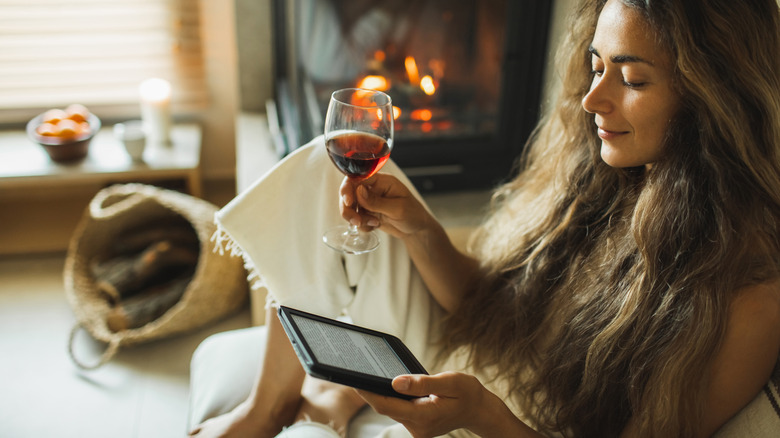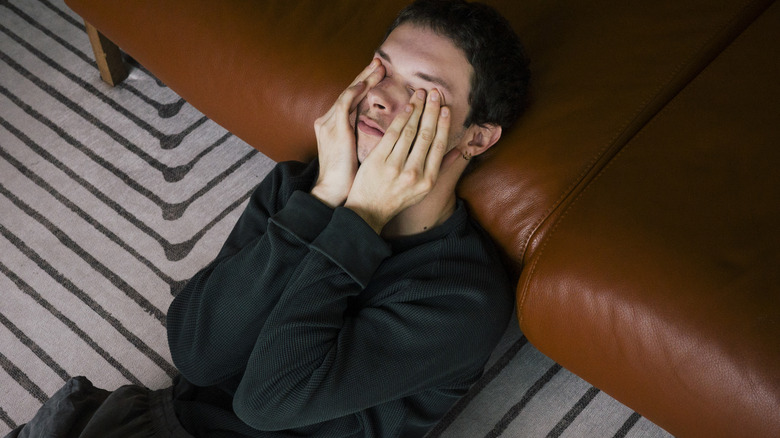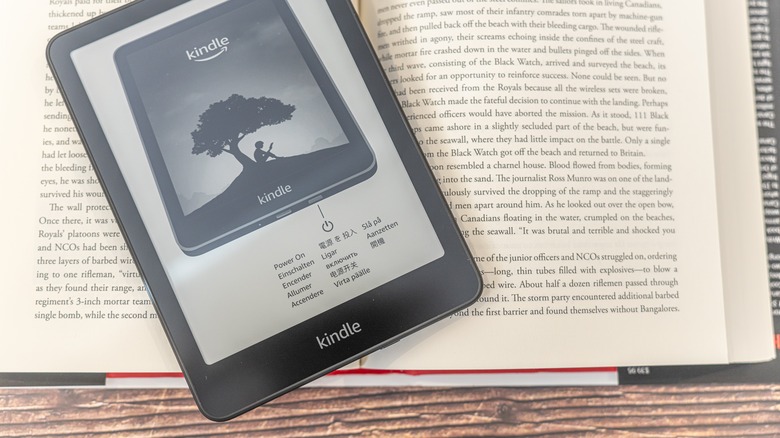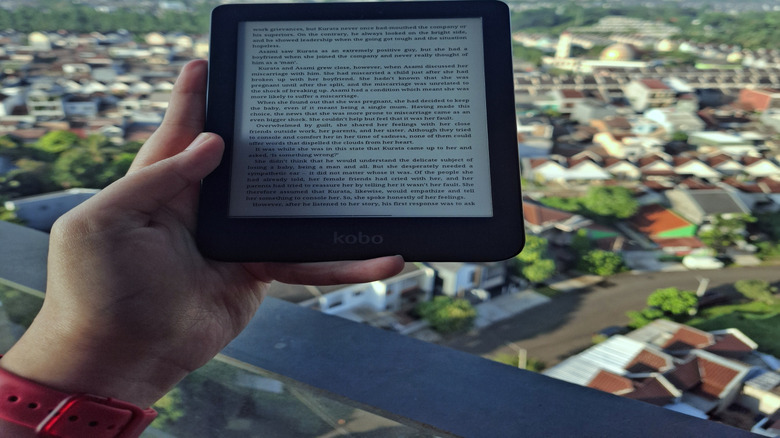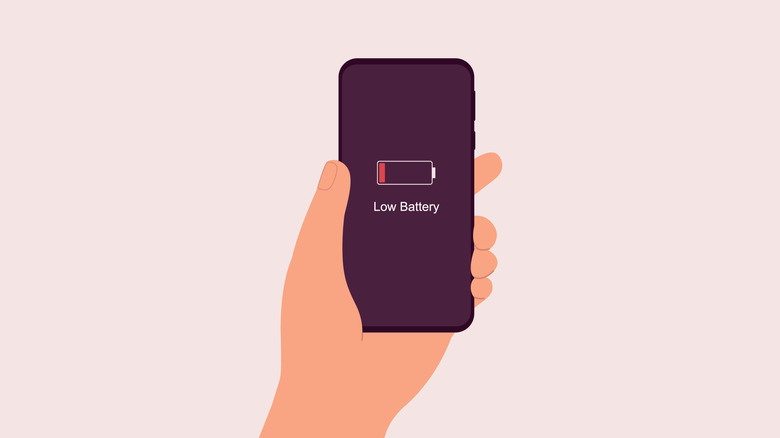5 Benefits Of Using An eReader Over A Smartphone Or Tablet
We may receive a commission on purchases made from links.
Paper books will always hold a special nostalgic charm, but the day has come to finally admit that e-readers are simply better. Flagship e-readers can hold thousands of books, support a built-in backlight, offer a one-tap dictionary, include waterproofing, and have batteries that keep chugging for so long you almost forget about charging them. You can turn any book you own into an e-book, and you can download your library books on your Kindle with Libby. Many of the best e-readers now have color displays for viewing comics and other color content, and if you're looking for something smaller, plenty of alternatives to the phone-sized Boox Palma exist. Truly, the only thing they're missing is the smell of paper. But if you can read e-books on your phone or tablet, why bother buying an e-reader?
So many reasons. Really, we've struggled to keep this list down to just five items. Smartphones and tablets are great for having your e-books anywhere, but that's the only real upper hand they hold. These are five reasons we think you should invest in an e-reader over Apple Books or the Amazon Kindle app.
Reduce eye soreness (and possibly sleep better)
It's no secret that we spend too much time behind screens. Data Reportal's 2023 report suggests a person's daily screen time average is almost seven hours. We don't even blink at concerning statistics like the fact that 31% of American adults are constantly online (via Pew Research). A good chunk of the populace suffers from "computer vision syndrome." Since we're staring into a digital spotlight all day, dry eyes, blurry vision, and headaches are practically normal. Some argue there's no evidence that constant screen time causes long-term damage, while others are concerned we could be in for a gargantuan epidemic of myopia. Whichever is true, one thing is certain: Anything that reduces screen time is good, and an e-reader does that.
Aside from eye soreness, screens affect sleep quality. Experts recommend staying away from any light-emitting electronics (i.e., screens) a couple of hours before you sleep. E-readers let you have your cake and eat it too, so to speak — an electronic device that gives you the benefits without the downsides. Plus, it's wise to establish a wind-down bedtime routine with relaxing activities. Reading before bed is one of the best choices, and an e-reader incentivizes you to stay off your phone.
Don't worry too much about blue light affecting your sleep. Recent research suggests that's a myth; it's actually screen time itself that reduces sleep quality. Many believe that simply enabling night mode on their phones is enough. If you're an avid before-bed phone reader, it may be time to consider a Kindle or a Nook.
Enjoy a minimalistic, paper-like reading experience
Ask someone why they haven't yet bought an e-reader, and one of the first things they'll say is that reading a book is a haptic and olfactory experience as much as a visual one. Cue comments about the smell of new (or old) books and the between-fingers sensation of turning pages. Smartphones and tablets, by comparison, feel sterile, clinical, and mechanical — and to a certain extent, so do e-readers. However, we'd argue that most people would love all those digital benefits (thousands of books in one device, backlights, on-demand dictionaries, the works), but that desire for nostalgia and minimalism makes a smart device unfit. Once again, an e-reader is a happy halfway point between digital convenience and old-fashioned minimalism.
If you've ever used an ink screen, you'll know it does an incredible job at reproducing the look and feel of paper. It's unlikely we'll ever see an e-reader that fully mimics a book — its pages or its smell — but e-readers come close enough.
In my own experience as a voracious reader, you get so used to the e-reader experience that, eventually, it becomes indispensable. Obviously, I still cherish that sensory experience of flipping through a paperback at the local bookstore. Paper copies can never be replaced, of course, and they're a solid choice in an age where DRM is eradicating content ownership. Still, the e-reader is my default; 95% of my reading happens on e-ink, and barring an EMP that wipes out all electronics on earth, it will stay that way.
Avoid digital distractions
Smartphones are engineered to be as distracting as possible, so much so that some studies suggest the mere presence of a smartphone can impair your focus (via Harvard Health). It's well established that multitasking is terrible for productivity, especially reading. Anyone who has let their smartphone interrupt a book knows it sours the experience. Reading on a smartphone or tablet is, therefore, much worse since these devices don't offer any comprehensive means of cutting distractions for maximum focus. This Android feature will ensure that you get work done, and iPhone focus modes help cull notifications. Yet, short of turning off your phone, nothing can stop you from swiping to another app. Phones fuel that compulsive itch to check social media or messages. Enter: e-readers.
An e-readers offers very few distractions. At most, you can browse its bookstore or use its browser to check a website. Despite this, the black-and-white, low refresh rate e-ink screen makes non-reading activities highly unappealing, and most e-readers don't support notifications or other distracting apps. I've found that the only distraction e-readers pose is that, when I get bored with one book, it's all too easy to switch to another. Not a bad distraction to have, all things considered.
A compelling case has been made that digital reading (including e-readers) is less productive than physical book reading. However, this has been contested by equally compelling meta-analyses. The jury is still out — but an e-reader does, at least, win against smartphones when it comes to digital distractions. Anecdotally (as a former book/smartphone reader), it wasn't until getting an e-reader that I started finishing several dozen books a year.
Read easily outdoors
The top five Android smartphones usually have the most impressive display specs, and one particular selling point is their brightness. Watch any smartphone reveal or review, and someone is bound to mention how many nits of brightness it offers. Brighter screens are essential for outdoor reading, but they also mean killing the battery a lot faster. Overheating is another issue; if you leave your iPhone in the sun for too long, it may overheat and give you a scary "iPhone needs to cool down" message. Not only will your phone become temporarily unusable, the heat can permanently hurt your phone's battery. Surprise, surprise — e-readers don't have these problems at all.
Ask people who read outdoors with their Kindle, and they'll tell you that their e-reader is perfectly legible — and notably, cool — even in bright sunlight. I can say from my own experience that this is true. Countless hours spent with my Kindle at the beach or at the park prove that there are no visibility issues, and the low power consumption on e-readers means overheating is rarely a consideration. Most flagship e-readers these days have strong waterproof IP ratings too, like smartphones, so they won't run into any problems near a pool or in a sudden downpour.
Going back to what we said earlier, eye strain is a major concern with smartphones. Since e-readers encourage you to read them with lamps and sunlight, like a physical book, there's arguably an incentive to gravitate toward those light sources. A smartphone won't ever tell you to get up off the couch or out of bed if it's a sunny, beautiful day outside — but an e-reader gives you all the reason in the world, especially if it doesn't include a backlight.
Save a bit of smartphone battery
The best smartphones out there tend to be the phones with the best battery life. "All-day battery" is one buzzword smartphone manufacturers love to trumpet, even if it isn't entirely true. Unfortunately, until the battery revolution comes, we're stuck finding ways to make our lithium-ion-based smartphones last. Reading on a smartphone certainly isn't as draining as scrolling social media, but it does contribute — especially if you're reading out in the sunlight with that brightness turned up to max. E-readers take the burden off your poor smartphone, provided you don't mind carrying around that extra device.
The Amazon Kindle Paperwhite boasts about 12 weeks of battery. Keep in mind that Amazon presumably calculates battery life with Wi-Fi and backlight enabled. Disabling both will prolong things. Personally, I leave my Kindle in airplane mode most of the time, and it blows way past that 12-week mark with plenty of juice to spare. That's when reading for at least an hour a day, usually with the backlight on, mind.
A common complaint about battery-powered devices is that they induce additional, unwanted battery anxiety; wondering whether your Bluetooth earbuds are charged when you hit the gym, for example, adds stress you don't need. With e-readers, battery anxiety more or less does not exist. You can quite literally go without checking the battery level for weeks at a time. The battery life is so insanely long that it's highly unlikely your e-reader will die on you when you're out and about — and if it does, you'll likely have squeezed out at least a few hours of reading, anyway.
